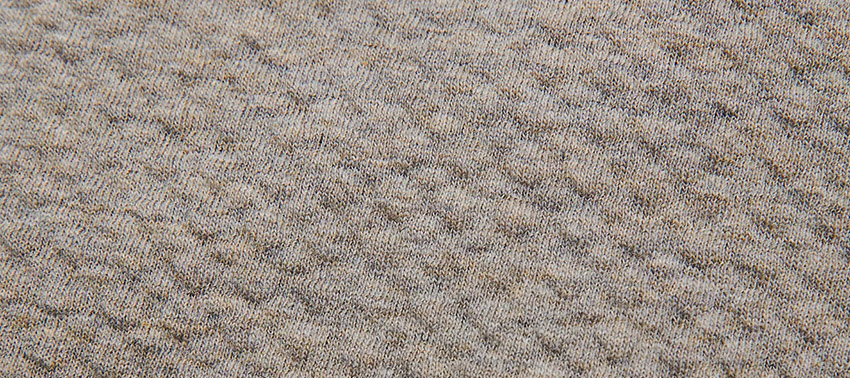Ever felt confused about choosing the right fabric for custom hoodies? With so many fabric options out there, how do you pick the one that's comfortable, durable, and matches your brand image? Whether it's for everyday wear, sports, or brand promotion, the fabric for custom hoodies you choose directly impacts both the wearing experience and brand perception. In this ultimate guide, we'll explore the best fabric for custom hoodies to help you make the best choice for a hoodie that truly represents your brand.
Pros:
· Comfortable and breathable: Cotton is super soft and skin-friendly, making it perfect for all-day wear. It’s one of the most common fabrics for custom hoodies.
· Natural and eco-friendly: As a natural fiber, cotton is better for the environment and a sustainable choice.
· Easy to care for: Cotton fabrics are easy to wash and durable enough to withstand multiple washes.
Cons:
· Wrinkles easily: Cotton tends to wrinkle, so you might need to iron it after a few wears.
· Absorbs moisture: Cotton can absorb sweat, which may leave you feeling damp during intense physical activity.
Best for: Casual wear, light physical activities, or warm weather. Custom hoodies made with cotton provide excellent breathability and comfort, perfect for everyday use.
Brand Highlights:
· Nike: Uses 100% cotton in many of their basic hoodie lines, offering comfort and a natural feel for daily wear.
· Everlane: Focused on sustainability, Everlane uses organic cotton for their custom hoodies, offering both comfort and eco-friendliness.

Pros:
· Durability: Polyester is extremely durable, resistant to wrinkles and wear, making it ideal for long-term use in custom hoodie fabrics.
· Quick-drying: Polyester fabrics wick away sweat, keeping you dry and comfortable during intense activities.
· Color retention: Polyester holds its color well and doesn’t fade easily.
Cons:
· Poor breathability: Polyester doesn't breathe as well as cotton, which can make you feel hot and sweaty, especially in warm weather.
· Not as soft: While it's durable, polyester may not feel as soft as cotton.
Best for: High-intensity sports, outdoor activities, and situations where durability and moisture-wicking are key. Great for running, cycling, or gym workouts. Polyester is a top contender when choosing the best fabric for custom hoodies designed for activewear.
Brand Highlights:
· Adidas: Known for their sports gear, Adidas uses polyester in many of their activewear pieces, combined with moisture-wicking technology.
· Uniqlo: Uses high-performance polyester fabrics in their activewear line, offering both comfort and functionality for everyday activities.
Pros:
· Comfort and stretch: The mix of cotton and spandex gives you the comfort of cotton with added flexibility and stretch, making it a popular choice for custom hoodie fabric.
· Shape retention: Spandex helps the fabric maintain its shape, so your hoodie won’t become baggy after a few wears.
· Good breathability: Cotton ensures breathability, while spandex adds flexibility for better movement.
Cons:
· Poor moisture absorption: Spandex doesn’t absorb sweat as well, which may leave you feeling damp after intense exercise.
Best for: Casual wear, yoga, light exercise, or any activity that requires comfort and stretch. A great option when choosing fabric for custom hoodies intended for active wear.
Brand Highlights:
· Lululemon: Known for their high-quality athletic wear, Lululemon uses cotton/spandex blends to give their custom hoodies both comfort and stretch, ideal for yoga and running.
· Zella: This brand uses cotton/spandex blends to create comfy, flexible custom hoodies that are perfect for fitness and yoga enthusiasts.
Pros:
· Durability and stretch: Polyester gives the hoodie durability and resistance to wear, while spandex adds stretch for a more comfortable fit in custom hoodie fabrics.
· Moisture-wicking: The polyester helps to wick moisture away, keeping you dry and comfortable during high-intensity activities.
· Long-wearing comfort: These fabrics are ideal for long durations of wear, especially in active scenarios requiring stretch and movement.
Cons:
· Average breathability: While polyester is great for moisture-wicking, it doesn’t breathe as well as natural fibers like cotton, which can cause discomfort in humid conditions.
Best for: High-intensity sports and outdoor activities like gym sessions, running, and skiing, where durability, comfort, and movement are essential. A top choice when considering best fabric for custom apparel.
Brand Highlights:
· Nike: Uses a polyester/spandex blend for their sports line, combining moisture-wicking tech to keep athletes comfortable during intense workouts.
· Under Armour: Known for their "HeatGear" technology, Under Armour uses polyester/spandex blends in their custom hoodies for breathability and comfort during high-intensity exercise.
Pros:
· Excellent warmth: Fleece is perfect for cold weather because it traps heat, keeping you warm in winter conditions.
· Lightweight and comfy: Despite being warm, fleece is light and doesn’t make you feel bulky.
· Soft feel: Fleece is super soft, providing a cozy, plush feel that’s perfect for winter.
Cons:
· Pills over time: Fleece can develop little pills (those annoying balls of fabric) after some use, which can affect its appearance.
· Low moisture absorption: Fleece doesn’t absorb moisture well, so it’s not the best choice for post-workout wear.
Best for: Cold weather, winter activities, and casual outdoor wear like skiing, hiking, or just lounging around. Fleece is a great option for custom hoodie fabrics that need to provide warmth and comfort.
Brand Highlights:
· Patagonia: Known for their eco-friendly approach, Patagonia’s “Better Sweater” line uses fleece for warmth and comfort in cold weather.
· The North Face: Their fleece custom hoodies are designed for outdoor activities like skiing and hiking, offering warmth and durability.
Pros:
· Exceptional warmth: Wool and cashmere provide amazing insulation, keeping you toasty in cold conditions.
· Natural and eco-friendly: Both materials are sustainable, comfortable, and luxurious.
· Luxurious feel: Cashmere, especially, feels ultra-soft and has a luxurious touch.
Cons:
· Expensive: Cashmere is costly, so these fabrics may not fit every budget.
· Requires special care: Wool and cashmere need careful handling and special cleaning, making them higher-maintenance than other fabrics.
Best for: Cold weather, particularly in the high-end market. Great for upscale brands looking for luxurious winter apparel.
Brand Highlights:
· Loro Piana: This Italian luxury brand is famous for its use of cashmere and wool, offering some of the softest, warmest, and most elegant custom hoodies.
· Everlane: Everlane’s cashmere collection provides both luxury and sustainability, perfect for a stylish yet eco-conscious winter wardrobe.
When selecting fabric for custom hoodies, it's not just about the material. There are other factors to consider, such as fabric weight, texture, and whether the fabric supports custom printing. Here are some things to keep in mind:
· Lightweight fabric (150-200g/㎡): Best for spring and autumn, or warmer weather. Lightweight fabrics are breathable and ideal for casual or sporty wear.
· Medium-weight fabric (200-300g/㎡): Great for mild weather or versatile wear. Works well in spring and autumn or for indoor/outdoor activities.
· Heavyweight fabric (300-400g/㎡): Perfect for cold weather. Thick fabrics offer warmth and durability, ideal for winter and outdoor activities.
· Plain weave: A simple, durable fabric perfect for everyday wear.
· Twill/Weave: Adds some style and elasticity, ideal for casual and sporty brands.
· Fleece: Soft and plush, perfect for cold weather and cozy feels.
If you want a sharp, detailed print, go for polyester or cotton blends that are easy to print on. For luxury or minimalist designs, consider wool or cashmere.

In conclusion, selecting the best fabric for custom ho
